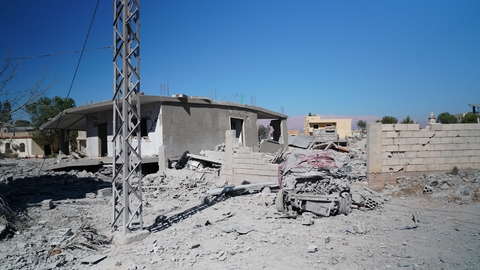Testominy 1
Rita Barotta
My name is Rita Barotta. I am a member of a feminist collective that fights for women's rights in
the Bekaa1 , advocating for their right to public spaces and access to knowledge.
When the Israeli war on Lebanon erupted, the life we knew ceased to exist.
I found myself working in direct relief, thrown into a reality where survival became the priority.
Days blurred into nights, and I worked 18-hour shifts, moving between very few schools that
turned into shelters. I focused on private dwellings where families had fled, hidden places where
no one knew of them, and where no NGOs reached.
These were homes turned into temporary shelters, spaces where women and children carried the
weight of displacement in silence, afraid of being forgotten.
I answered calls for help, witnessed loss beyond comprehension, and tried to fill the gaps where
no official aid arrived.
In the chaos of war, I saw women—mothers, daughters, grandmothers—who had no say in why
wars begin or how they end. Yet, in between, they bear the heaviest burdens. They live in
constant oppression, silence, and agony, forced to navigate a world shattered by violence.
Their suffering remains unseen, their resilience unspoken, their grief unheard.
These testimonies are not just stories; they are lives, and voices that deserve to be acknowledged.
Women in war do not just endure; they survive, they fight in their way, and they carry worlds
within them.
This is for them.
Lebanese-Israeli War 2024.
War is often told through headlines, casualty counts, and sweeping narratives of national loss.
Within these generalized accounts, the individual, and especially the woman, usually folds into
a collective experience that overlooks her personal suffering, resilience, and survival. This
project seeks to break that silence by documenting the voices of displaced women, whose lives
were irrevocably changed by war but whose stories rarely find space in public memory.
Through a series of deeply personal testimonies gathered from women in shelters and
displacement homes in Lebanon’s underprivileged urban peripheries, particularly in regions
like the Bekaa and Baalback, we aim to highlight the layered and often invisible impact of
conflict on women. These areas receive minimal attention from the government, and many are
underdeveloped, with weak infrastructure making it more difficult to live a dignified life.
The testimonies collected in this project are not just about displacement; they are about
motherhood under fire, generational trauma, loss without closure, and strength in the face of
abandonment. They reflect how women carry war in their bodies, silences, and quiet acts of
endurance. By centering their voices, we challenge the dominant, family-centered narratives
of war and bring forward a gendered lens that reveals the intimate and often overlooked
dimensions of conflict.
This project is both an act of documentation and of recognition. It insists that women’s
experiences during war are not secondary; instead, they are central. Their voices deserve to be
heard not as background noise to the chaos, but as the heartbeat of survival itself.
- 1
1 The Bekaa is a fertile valley in eastern Lebanon, stretching from the Syrian border in the north to the southern part
of the country. It is Lebanon’s largest governorate and is historically known for its agricultural significance. The
region has also been deeply affected by conflicts, hosting displaced communities and bearing the brunt of war-
related displacements.
